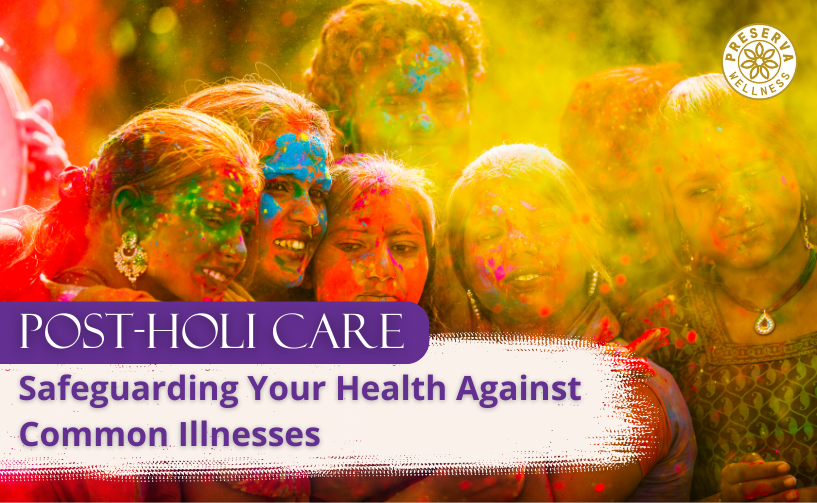Holi is an ancient Hindu festival that is celebrated annually in India and Nepal. It's a festival of colours that celebrates the victory of good over evil and the arrival of spring. During Holi, people come together to play with vibrant coloured powders and water, dance to traditional music, and enjoy a variety of delicious foods.
While Holi is a joyful occasion, it's essential to be mindful of potential health risks associated with the colours and food consumed during the festivities. The colours used during Holi are often made from synthetic dyes, which can cause skin irritation, eye infections, and respiratory problems. Similarly, festive foods may be high in sugar, oil, and artificial additives, which can increase the risk of digestive problems, food poisoning, and other illnesses.
In this blog, we will explore five common illnesses that may arise after Holi and provide preventive measures to ensure a healthy and enjoyable celebration. We will discuss how to protect your skin and eyes from the harmful effects of synthetic colours, how to choose healthy and safe foods, how to stay hydrated, and how to maintain good hygiene during and after the celebrations.
Skin Woes: Derma Allergies and Irritations
Holi colours, often laden with chemicals, can lead to skin allergies, rashes, and other dermatological issues. The harsh chemicals can strip the skin of moisture, causing dryness, itching, and even acne. Some colours may contain minuscule glass bits, posing a risk of injuries. Opting for organic or homemade colours is ideal, but in public celebrations, exposure to unnatural colours is unavoidable. To counter skin problems, it is crucial to moisturise and cleanse the skin thoroughly after the festivity.
Respiratory Challenges: Inhalation of Chemicals
Participating in chaotic colour play can lead to accidental inhalation of colour particles, especially for those resisting the festivities. This can be particularly problematic for individuals with asthma or allergies, potentially triggering respiratory disorders. Caution and avoiding overly crowded or inebriated spaces during celebrations can help minimise the risk.
Hair Woes: Battling Post-Holi Hair Fall
The process of removing colours from hair often involves multiple washes with harsh shampoos and conditioners. This can strip the scalp of its natural oils, leading to hair dryness, brittleness, and dandruff. To mitigate hair-related issues, it's advisable to wash hair promptly after the celebrations and use mild, nourishing products to restore moisture.

Seasonal Woes: Common Cold and Influenza
Holi, occurring on the verge of winter and spring, can expose individuals to fluctuating weather conditions, increasing susceptibility to colds, coughs, and flu. Playing with cold water during the festivities can contribute to this. Staying adequately warm, especially after getting wet, and taking preventive measures like staying hydrated can help ward off these seasonal ailments.
Digestive Distress: Stomach Infections from Unhygienic Practices
Indulging in festive treats like Gujiyas, Malpuas, and several sumptuous delicacies without proper hand hygiene can expose individuals to stomach infections. Bacteria-laden hands may contaminate sweets, leading to digestive troubles. It's crucial to be mindful of hand hygiene, choose sweets wisely, and consider potential health risks associated with the consumption of offerings during Holi.

Preventive Measures and Post-Holi Care:
After the revelry, adopting a few simple measures can aid in preventing severe health issues:
Hand Hygiene:
Ensure you wash your hands thoroughly before eating any festive delicacies to minimize the risk of infections.
Eye Protection:
Shield your eyes from colour, as it can cause irritation and potential damage. Avoid places with unruly behaviour during celebrations.
Skin Sensitivity:
If you have sensitive skin, opt for a more controlled and subdued celebration to avoid overexposure to harsh colours.
Respiratory Health:
Individuals with respiratory issues should avoid prolonged exposure to water and crowds during the festivities.
Hair Care:
Tie long hair or use a scarf to protect it from colours. Wash your hair promptly and use mild products to retain moisture.
Hydration and Herbal Remedies:
Consume warm herbal-infused drinks or green tea after a post-Holi shower to aid detoxification.
Selective Eating:
Be cautious about consuming sweets offered during the celebrations. Choose wisely to avoid potential stomach infections.
Bhang Awareness:
Exercise caution with beverages served during Holi, as some may contain bhang (cannabis plant leaves). Confirm ingredients before consumption, especially if unsure.
Conclusion:
While Holi is a time for joy and celebration, it's essential to prioritise health and well-being. By being mindful of the potential health risks and adopting preventive measures, one can enjoy the festivities without compromising on post-Holi health.






